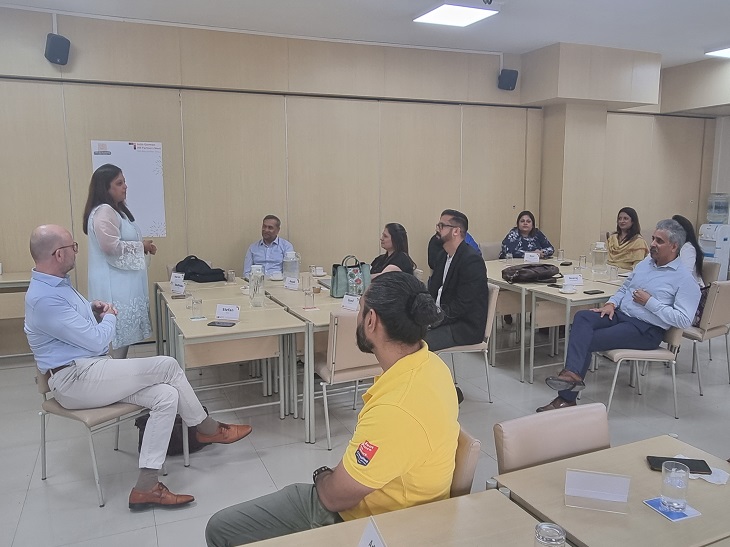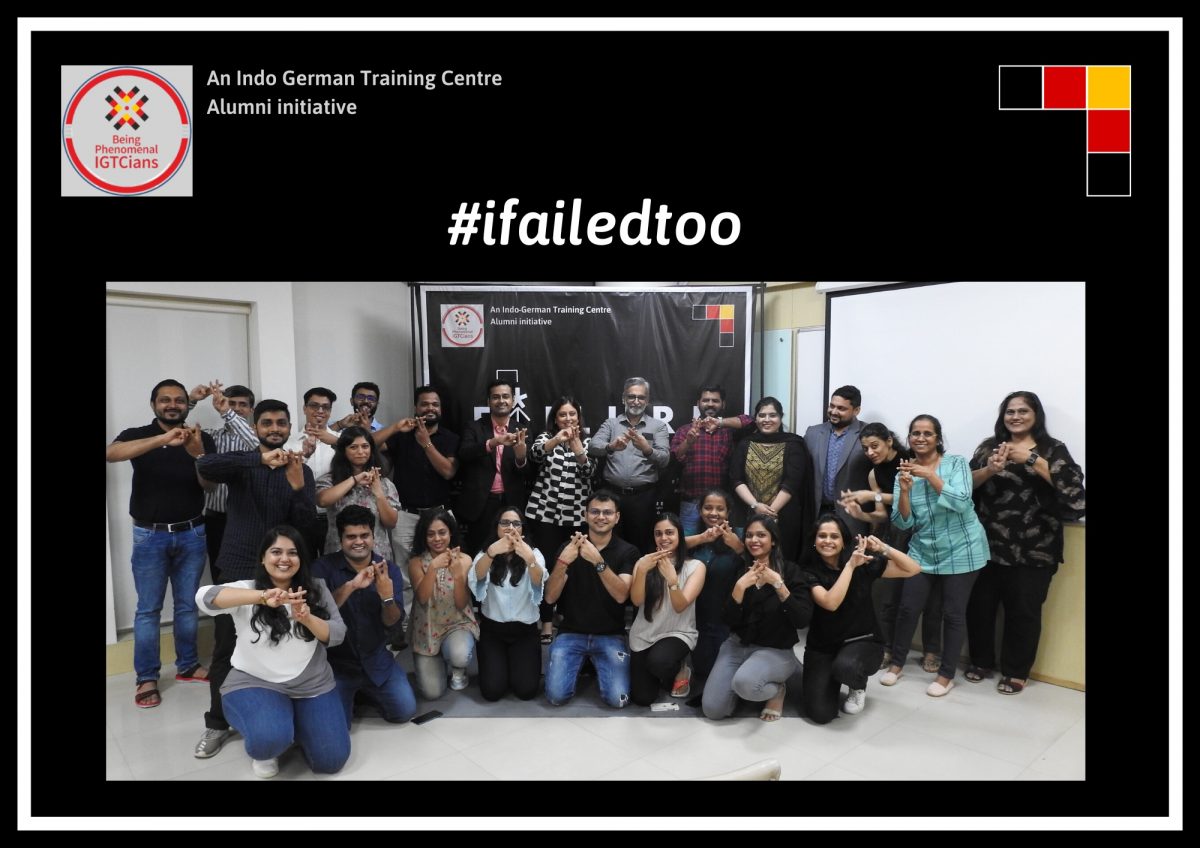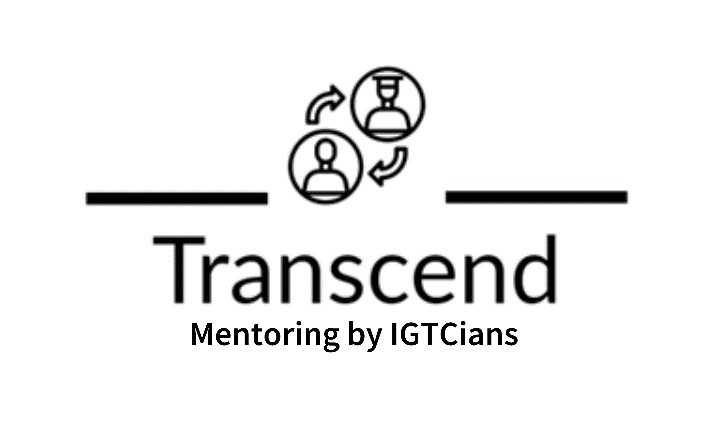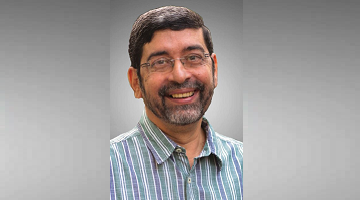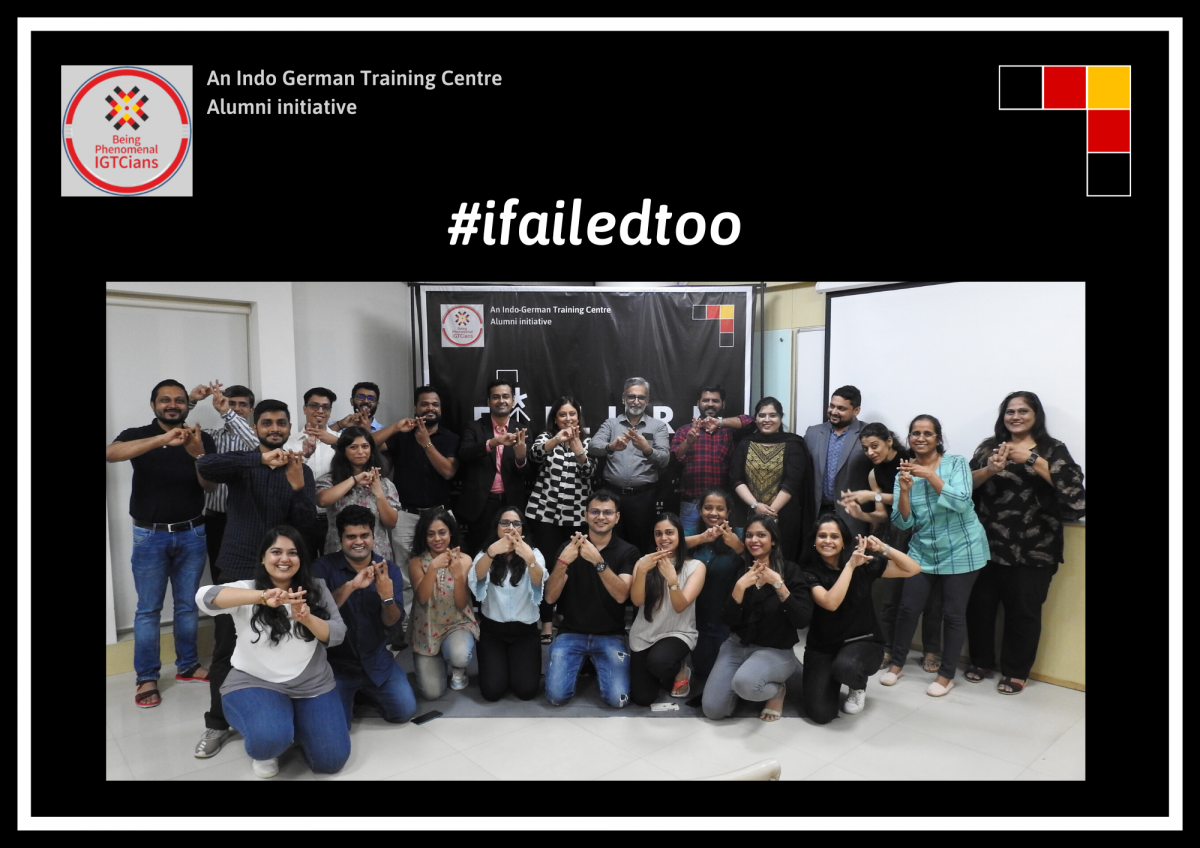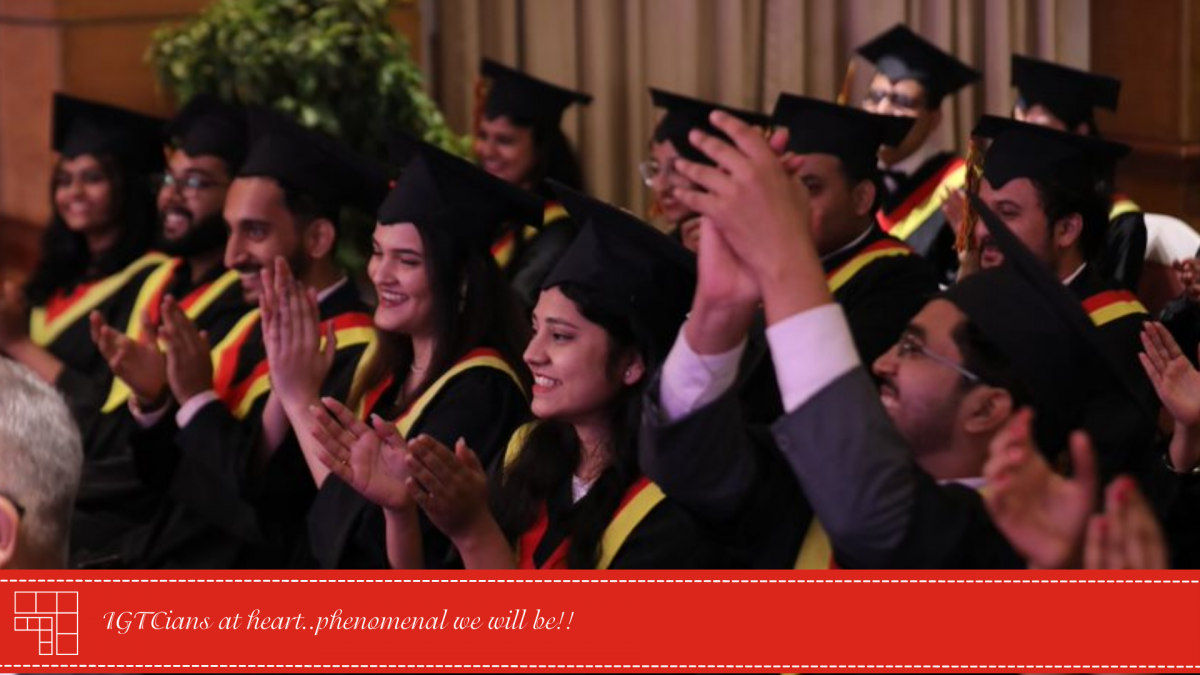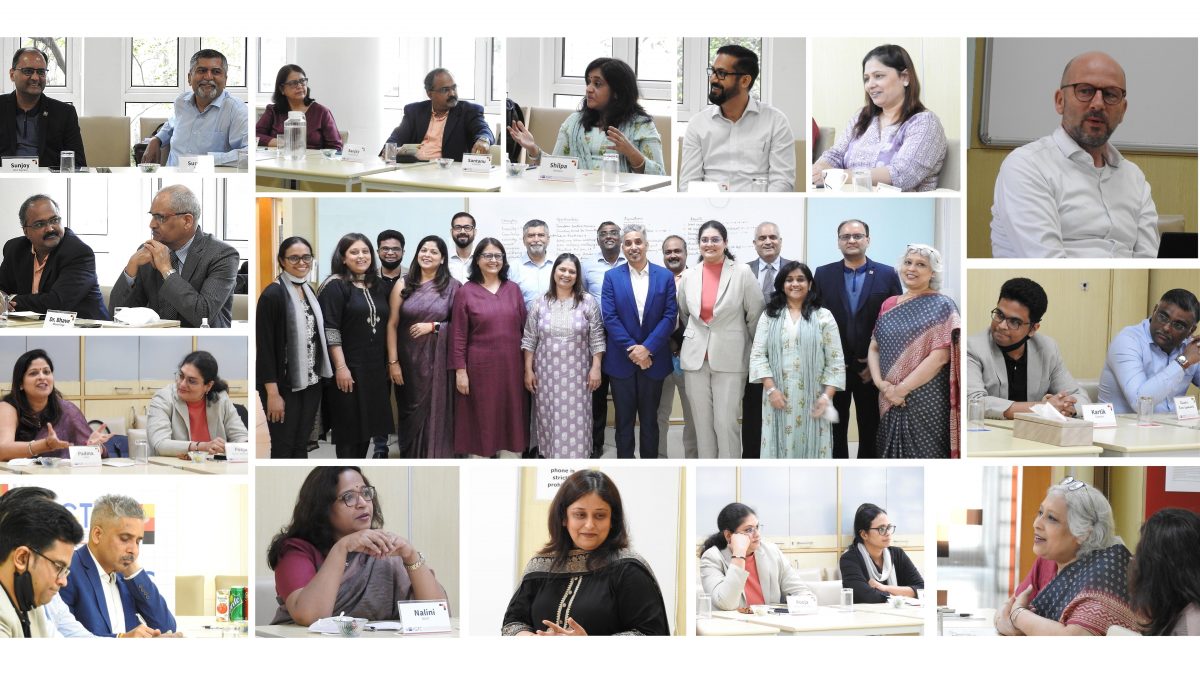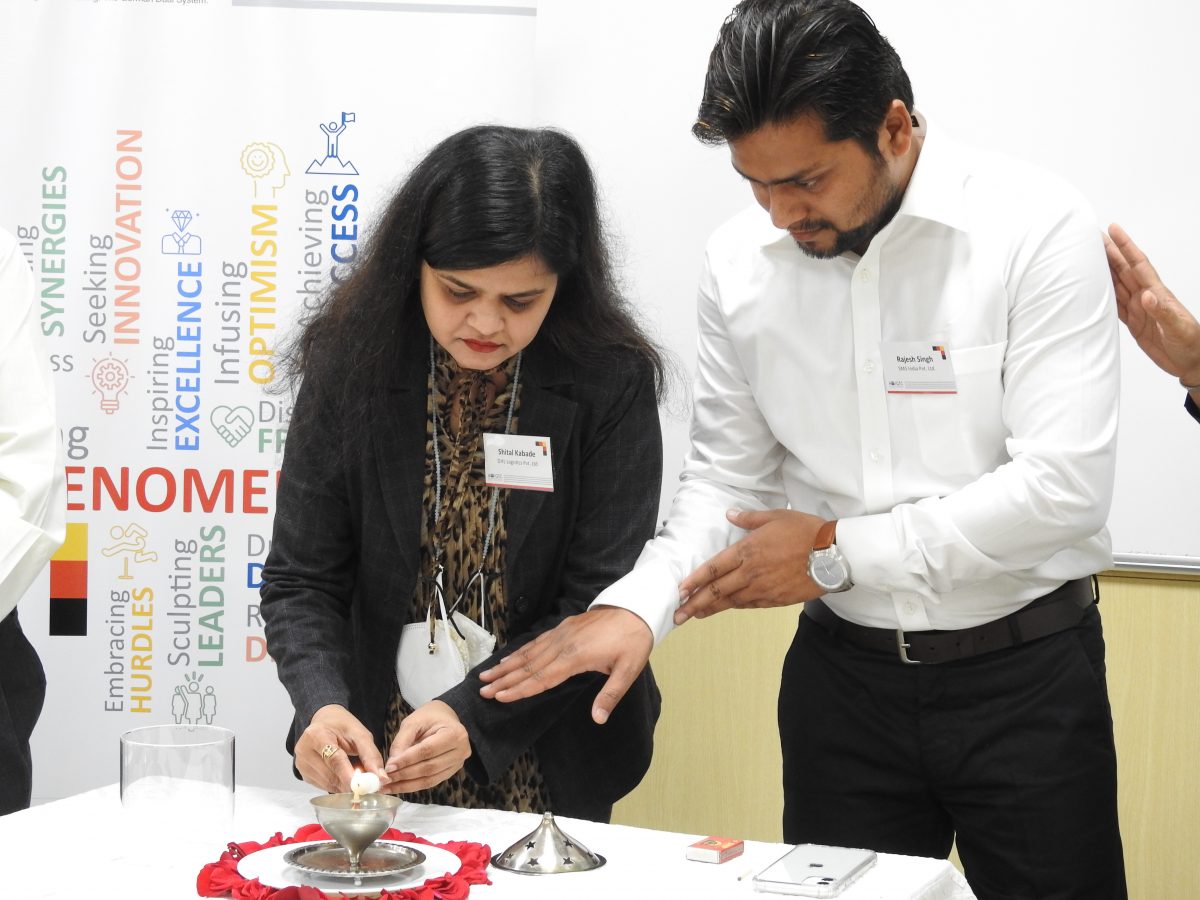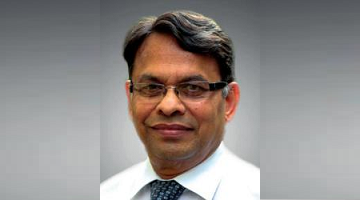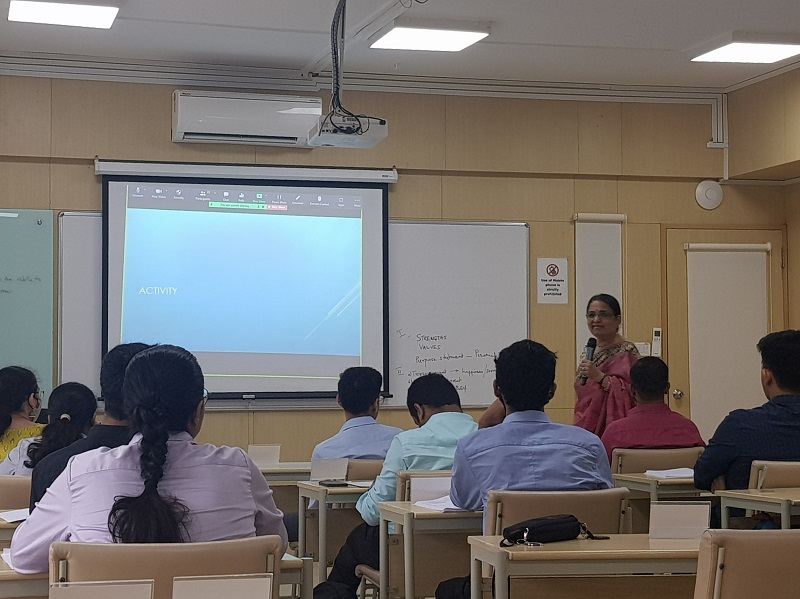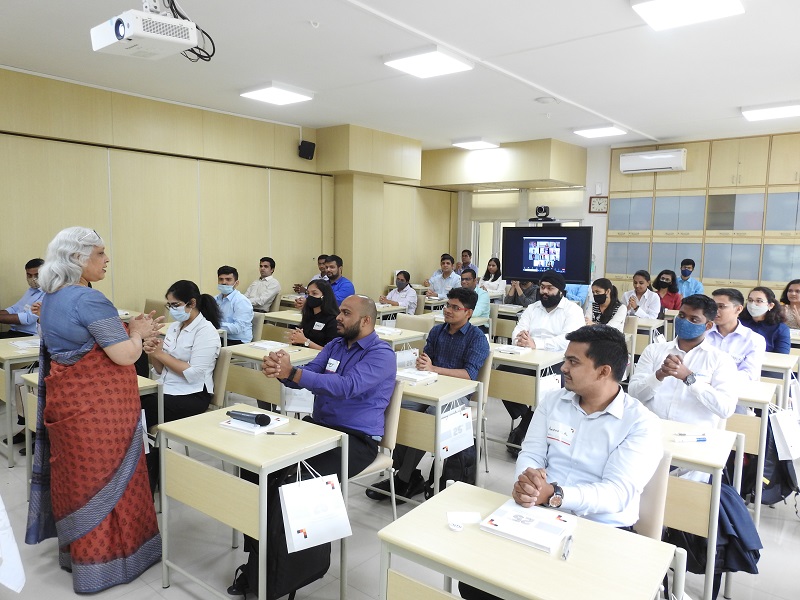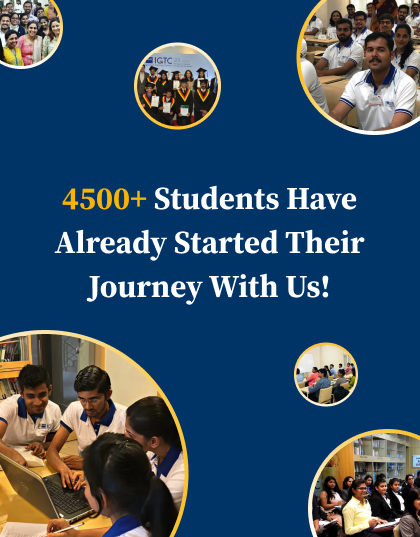Testimonials
Engagement with a difference, to make a difference!
“Life can only be understood backwards; but it must be lived forward”. With the prime focus being on what caused heartburns and what were the pressing issues for the HR fraternity in 2022, the Indo-German HR Fraternity converged on Monday 5th December 2022 to review and close the year gone by but with a promising outlook on 2023.
The meeting was attended by senior HR professionals; Anita Bandyopadhyay (Baerlocher India Additives), Rhea Doshi (BASF Group), KS Harish (Bayer Group), Smaranika Mohanty (Brose India Automotive Systems), Aditya Tiwari (Covestro India), Madhavi Lall (Deutsche Bank India), Aruna Subramanyan (Evonik India), Surjit Singh (Häfele India), Neeraj Gupta (Knorr-Bremse Technology Centre India), Sunil Antony and Vijayalakshmi (Lanxess India), Shilpa Kabra (Siemens Limited), Anjali Joshi (TUV India), Rosettee Silveira (Wacker Chemie India) to name a few. The meeting was hosted by Stefan Halusa, IGCC Director General and Radhieka R Mehta, IGTC Director IGTC.
Over five hours, the partners deliberated on a variety of burning issues such as
- acquisition of new talent
- compensations and negotiations
- moonlighting and gig workforces
- training to reskill existing talent and to remodel new mindsets
- focus on customer centricity, flexibility and digital skills
- importance of loyalty and longevity in the workplace
- empowering and facilitating business leaders to take HR decisions
- employee assistance programmes, holistic wellness and emotional wellbeing
- diversity and inclusion initiatives such as hiring of transgenders and dyslexics in the workplace
That was quite a bucket list to find solutions in 2023!
The partners agreed to create WOW – Ways of Working through subsequent meetings in every quarter of 2023. On that note, the collaborative meeting concluded with a lot of warmth and heartfelt wishes for a happy festive season and a new year full of inspiration, growth, transformation and celebration!
If you are an IGCC member company and wish to connect with the Indo-German HR Partner Forum, please email igtcdirector@indo-german.com.
Transcend Mentoring

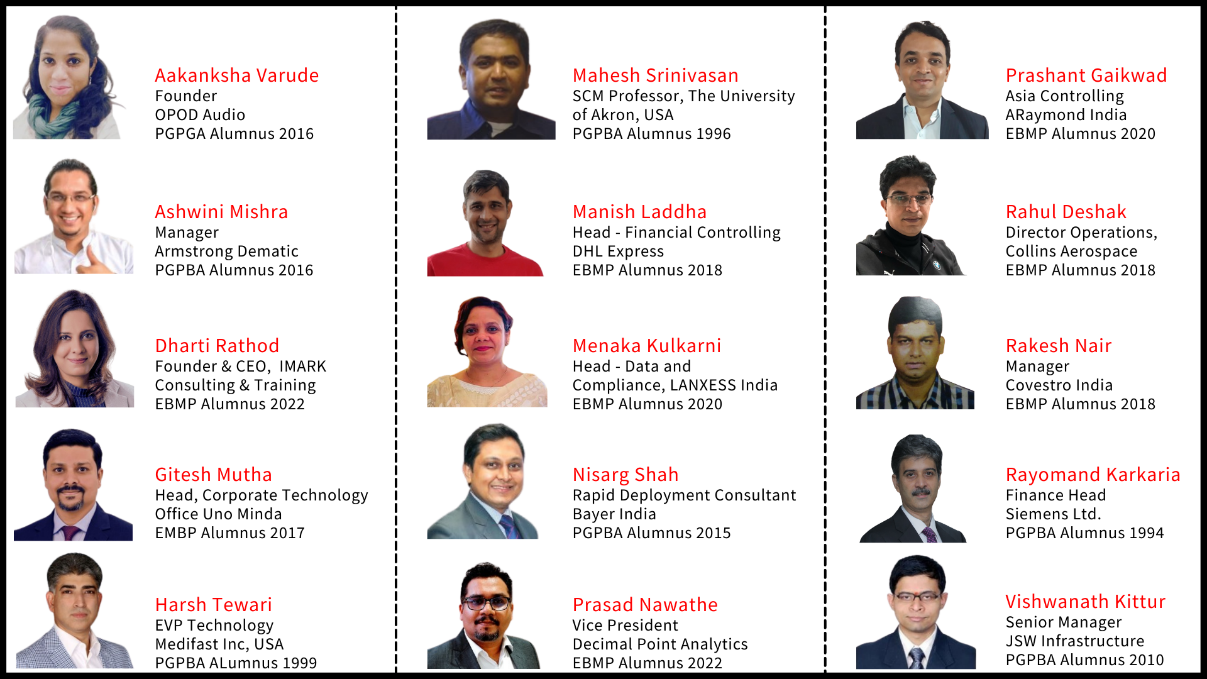
Transcend: Rise to the next level!
“A mentor is a torch bearer. One who shows you the way and how to navigate. Someone who sees more talent and ability within you, than you see in yourself, and helps bring it out of you.” With this belief, the Indo-German Training Centre along with its Alumni Catalyst team, is proud to launch “Transcend”, a mentoring initiative by the IGTCians for the IGTCians!
The idea is to facilitate a detailed 5 months programme starting from September 2022 – January 2023 between the full-time PGPBA students and the seasoned IGTC Alumni, who are industry professionals. The IGTC Alumni bring in years of experience, expertise, and learnings to groom the rookies, while the rookies bring in a lot of energy, enthusiasm and new ideas to the table to stimulate conversations and challenge status quo.
To ensure that there is a solid basis for the mentorship programme, one of the key responsibilities of the mentor is to adopt a group of PGPBA students and help them with the planning and execution of their final Integrated Business Project. The learning outcomes of this project are centred around the ability of the students to apply the theoretical concepts learnt and the critical insights gained at IGTC in all domains – Marketing, Operations, HR and Finance – to a live business project.
As soon as the project was announced, it was a delight to see that IGTCians across the past 3 decades came forth to volunteer their time and keen interest to participate in the programme. One month into the programme, here is some candid feedback from the mentors:
“My team is on track on their project. We have a weekly meeting and share updates of the status regularly. All the students are sharp, hardworking and keen learners. I think we need to take the mentoring program beyond the project too.” Rayomand Karkaria, Finance Head, Siemens Ltd., PGPBA Alumnus 1994
“A month ago, we started this program and it is truly going in line with your dreams. These young turks are really commendable in terms of their commitments, interest, eagerness to learn new things. Working with such young people has really made me learn more new things.” Vishwanath Kittur, Senior Manager, JSW Infrastructure, PGPBA Alumnus 2010
“It’s been a great experience mentoring the batch. They are matured and well prepared with what is expected from them. This enterprising attitude will sure help them grow leaps and bounds in their journey ahead.”
Ashwini Mishra, Manager, Armstrong Dematic, PGPBA Alumnus 2016
“Some great collective and interactive sessions are going on. I liked the responsiveness from the team for the project preparations. It is very visible that the students are getting well developed academically as well as on the professional front. Indeed, the esteemed faculties are honing them well, and outcome can be very well seen. It is a great learning for me also for recollecting the knowledge. Thanks for all the IGTC team is doing!!! Rahul Deshak, Director Operations, Collins Aerospace, EBMP Alumnus 2018
Here is what some of the mentees from PGPBA Batch 2021 – 2023 had to say:
“We had our 1st meeting with Aakanksha Varude. It was great getting introduced to inspiring personality like her. Thank you so much for the mentor-mentee program! Awdoot Kamble
“The conversation with Mahesh sir gave us good food-for-thought on our project. His experience really gives us a path. Despite the USA – India distance, there was no awkwardness in the meeting, no barriers in the exchange of knowledge and thought. We will surely get the most out of this mentor mentee initiative.” Saniya Mansuri
“Manish sir really liked our idea and shared his experience and knowledge on approaching the Capstone Project in a methodical way. He encouraged us to explore various data sources and interpret them in relevance to the project. The programme has definitely helped us to find a direction.” Sanika Phatak
“Our mentor Prasad Nawathe gave us the much-needed reality check and direction to the project. We spent time in planning the work and preparing a task list for the same. We feel that as a team, the mentor and us, are a perfect match and we can make good use of his valuable time and experience. Excited to see this collaboration unfold!” Nikhil Anandsekhar
“It is great to see some of you take time out of your busy schedules to mentor the IGTC students on their Business Plans. When I did my interim review, I found that the groups were more logical in their understanding of the market compared to the past. They had a clearer understanding of what is their offering to the customer and market. The PESTLE Analysis & Five Forces Analysis in most cases was well done, but in some cases the SWOT Analysis had conceptual errors of whether a particular fact could be a strength or an opportunity or there was an interchange between weakness and threat. Kudos to the Alumni Mentors and the Alumni Catalysts for launching this initiative.” Sagar Narsian, Marketing Faculty, IGTC
The entire credit for this initiative goes to the four extremely focused Alumni Catalysts –
Abhishek Gupta, Ashutosh Tewari, Gary Chandy and Urvil Matalia, who have shouldered the responsibility of conceptualizing, connecting to the mentors and executing this initiative along with Radhieka R Mehta.
IGTC plans to take this mentoring initiative to the next level by engaging mentors for different levels of alumni – e.g. if somebody is moving from individual contributor to a team management role, if somebody is entering into a mid-management role and if someone is moving from mid management to senior management roles. Because, after all, “today the lines between mentoring and networking are blurring. Welcome to the world of mentworking” Julie Winkle Giulioni
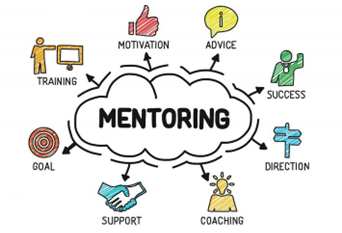
Failure Knights
Break the stereotype around failures!
Be a Failure Knight!
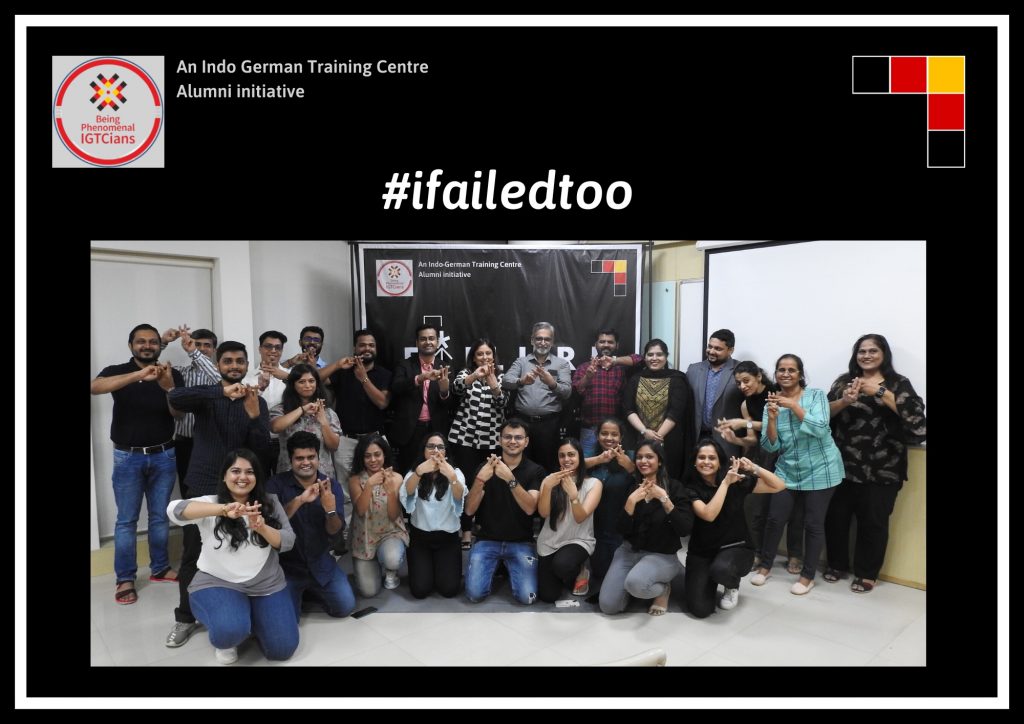
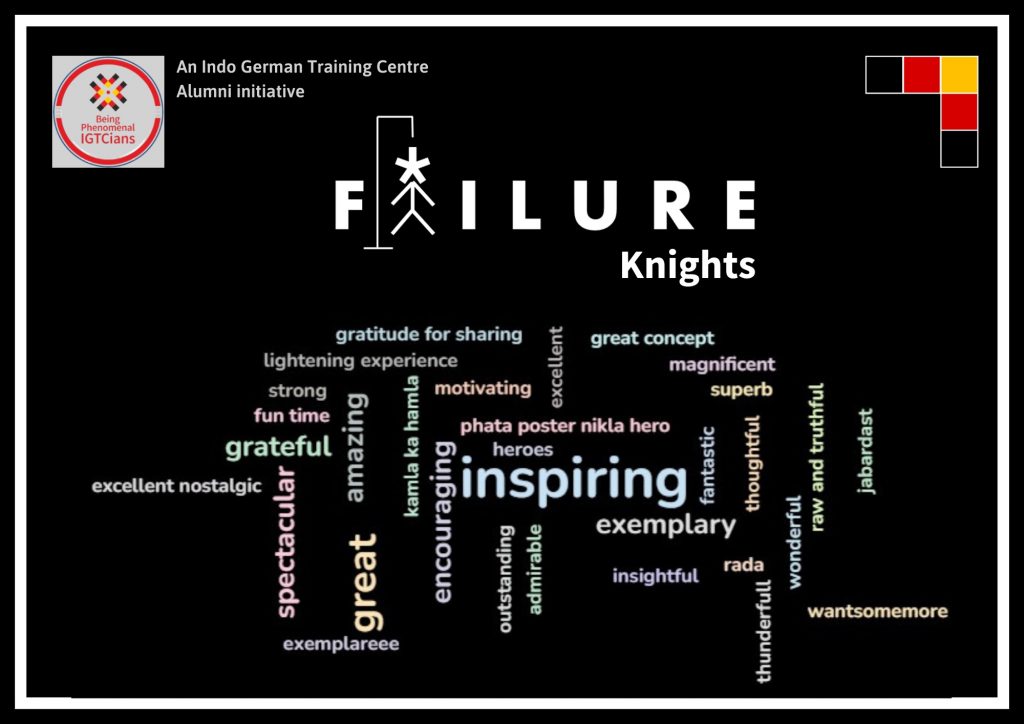
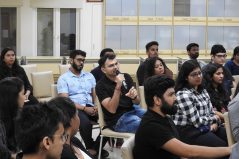
If you genuinely want to be a high achiever, you’re bound to do some things imperfectly. Success is overrated when spoken in isolation without the failures connected to it. Collectively confessing and celebrating failure makes failure socially acceptable, sparks innovation and keeps us from becoming too risk averse. Talking about failure began on a platform started in Mexico in 2012 when a group of friends candidly spoke about important professional failure. It initiated a magical conversation worldwide. Inspired by this idea, the IGTC Alumni also initiated an event to normalise the fear of failure called ‘Failure Knights’. The event was hosted at Indo German Training Centre at Churchgate, Mumbai on Friday, 15th July 2022. A combination of alumni across past 30 years joined the evening; some came in person to network while many joined virtually from across the globe!
By popular choice the two speakers aka ‘Knights’ were
- Hariharan – Design Thinker, Director Savoirfaire and a visiting faculty at IGTC
- Devarajan Iyengar – Head Rapid Deployment APAC at Bayer CropScience and PGPBA Alumnus 2001
Professor Hariharan spoke about his entrepreneurial challenges whilst IGTCian Devarajan spoke about trials faced during his professional journey. The evening was thought-proving for the audience. The sheer ability to talk openly about your failures demonstrated grit while being vulnerable. Both the knights encouraged the fact that failure is a reality that people should not elude.
Some candid learnings of the session were:
- Starting is easy, stopping is gutsy
- Some failures are meant to the learnings, not all failures can be converted into successes
- The fear of failure is not the failure itself but the fear of being judged
- Your competition doesn’t increase when you share / teach your skill to someone else
The evening concluded on this note:
When you try you may fail; when you fail you may realize; only when you realize you will grow; and when you grow you will survive!
To know more about the IGTC Alumni initiatives and engagement activities, please write to igtcalumnicatalysts@indo-german.com
Transcend
Experience is one of the most expensive assets you gain but how often do you use it to enrich your life in an unconventional way? It is with great pleasure that we launched the mentorship program ‘TRANSCEND’, an IGTC Alumni initiative for our PG students.
The idea is to provide opportunities for PG students to be mentored by seasoned IGTC Alumni, who are professionals/ industry veterans and for the professionals to be reverse mentored by the students.
The IGTC Alumni bring in years of experience, expertise, and learnings to groom the rookies. And the rookies bring in a lot of energy, enthusiasm, and new ideas to the table to stimulate conversations and challenge status quo.
To ensure that there is a solid basis for the mentorship programme, one of the key responsibilities of the mentor will be to help the students with the planning and execution of their Capstone Project. The learning outcomes of the Capstone Project are centered around gaining critical insights and ability of the students to apply the theoretical concepts in all domains – Marketing, Operations, HR and Finance.
Meet our current Mentors!
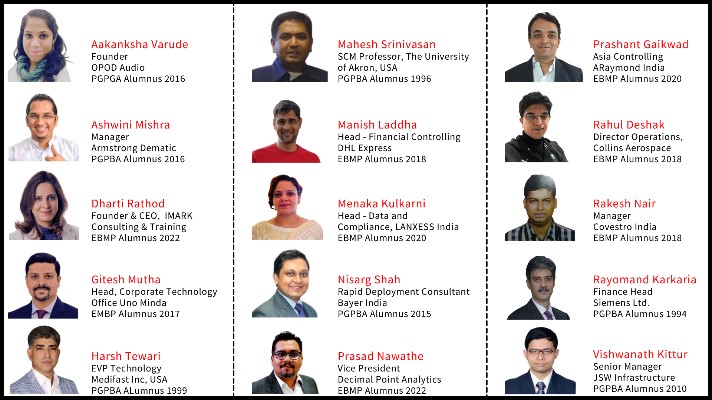
Blue Ocean Strategy
Back in the early 1960s, Bruce Henderson, the founder of Boston Consulting Group, asserted that there was only one way to successfully compete – gain a relative market share advantage over all competitors so as to have lower costs than all of them. On top of it, the firm will further reduce costs due to the learning curve advantage.
In 1980, Michael Porter pointed out that there is another way to compete: differentiation. His view of two generic strategies – cost leadership and differentiation – became very popular. He was categorical, that each company, ultimately, will have to choose either cost leadership or differentiation. Any company opting for both will “get stuck in the middle “.
In 2005, W. Chan Kim and Renee Mauborgne of INSEAD, in their book, “Blue Ocean Strategy’’ came up with a completely different approach. Their main contention was that companies, while remaining in the existing business (red ocean), should also identify new uncontested markets (blue ocean). In doing so, companies will simultaneously pursue cost leadership and differentiation.
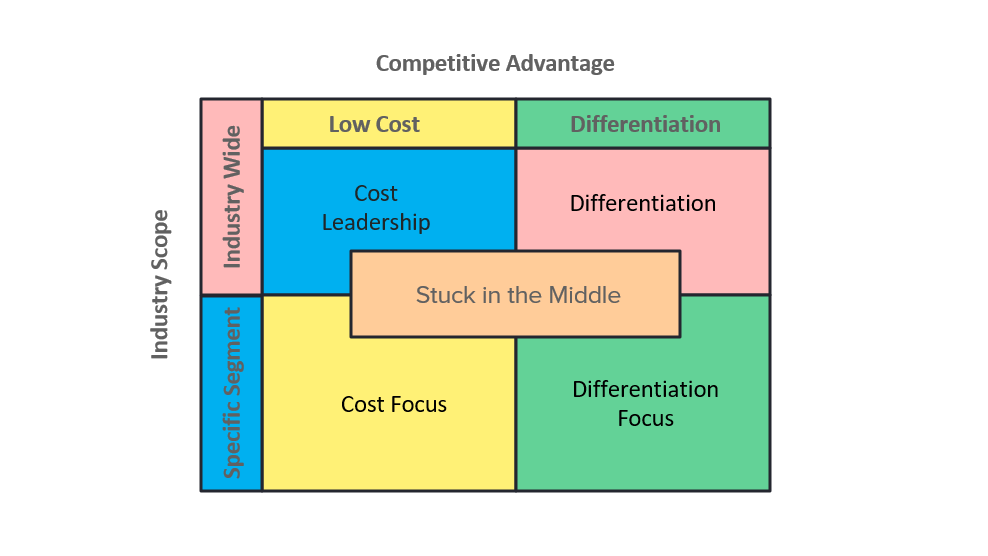
| Red Ocean Strategy VS Blue Ocean Strategy | |
| Competing in existing market space | Create uncontested market space |
| Beat the competition | Make the competition irrelevant |
| Make the value – cost trade-off | Break the value – cost trade-off |
| Align the whole system of a company’s activities with its strategic choice of differentiation or low cost | Align the whole system of a company’s activities with its strategic choice of differentiation and low cost |
Unlike many other strategy approaches, Blue Ocean Strategy comes with what and how to “do list ‘’. It not only clearly articulates the steps required, but also provides tools for each step.
Following, in brief, are steps involved in executing Blue Ocean Strategy:
- Identifying problem / customer pain points – which are restricting company’s growth
- Prepare ‘As is’ Strategy Canvas / Value Curve – to understand current status</li style=”list-style:number;”>
- Ideas to innovate – Six Path Framework (To identify blue ocean market)
- Carry out Eliminate, Reduce, Raise and Create (ERRC) analysis – this helps company to simultaneously pursue cost leadership and differentiation
- Prepare new ‘To be’ Strategy Canvas / Value Curve – which will be the starting point of implementation.
There have been many examples of success of Blue Ocean Strategy like Cirque du Soleil (Canadian circus company), Marvel, Nintendo, Stich Fix in fashion retail industry, Health Media in healthcare industry etc. A notable failure was Tata Nano.
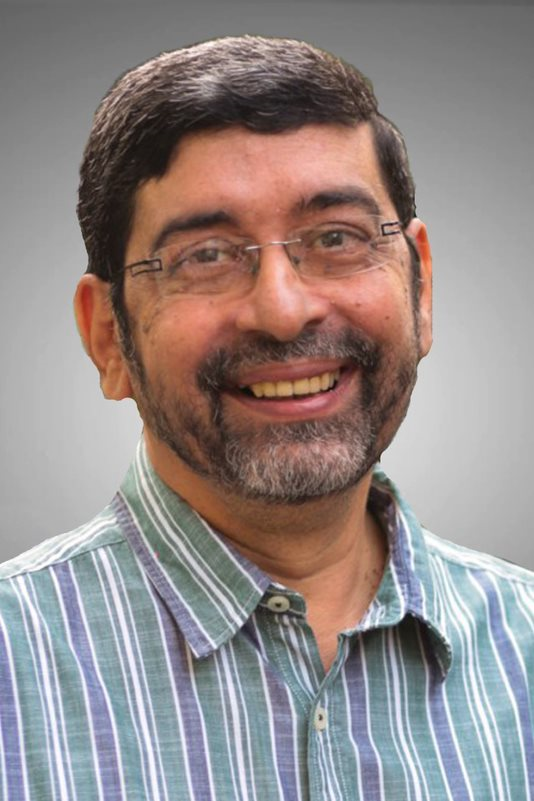
Mr. S.M. Fakih retired from a large multinational company as the head of strategy development. He teaches Strategic Management at IGTC. IGTC plans to conduct a one-day open program or can customize a program for your organization on “Business Unit Strategies – with special reference to Blue Ocean Strategy”. For details, please contact igtcdirector@indo-german.com.
Failure Knights
Fail-fast, fail fearlessly!
Be a Failure Knight!
If you genuinely want to be a high achiever, you’re bound to do some things imperfectly. Success is overrated when spoken in isolation without the failures connected to it. Collectively confessing and celebrating failure makes failure socially acceptable, sparks innovation and keeps us from becoming too risk averse. Talking about failure began on a platform started in Mexico in 2012 when a group of friends candidly spoke about important professional failure. It initiated a magical conversation worldwide. Inspired by this idea, the IGTC Alumni also initiated an event to normalise the fear of failure called ‘Failure Knights’.
The event was hosted at Indo German Training Centre at Churchgate, Mumbai on Friday, 15th July 2022. A combination of alumni across past 30 years joined the evening; some came in person to network while many joined virtually from across the globe!
By popular choice the two speakers aka ‘Knights’ were:
- Hariharan – Design Thinker, Director Savoirfaire and a visiting faculty at IGTC
- Devarajan Iyengar – Head Rapid Deployment APAC at Bayer CropScience and PGPBA Alumnus 2001
Professor Hariharan spoke about his entrepreneurial challenges whilst IGTCian Devarajan spoke about trials faced during his professional journey. The evening was thought-proving for the audience. The sheer ability to talk openly about your failures demonstrated grit while being vulnerable. Both the knights encouraged the fact that failure is a reality that people should not elude.
Some candid learnings of the session were:
- Starting is easy, stopping is gutsy
- Some failures are meant to the learnings, not all failures can be converted into successes
- The fear of failure is not the failure itself but the fear of being judged
- Your competition doesn’t increase when you share / teach your skill to someone else
The evening concluded on this note:
When you try you may fail; when you fail you may realize; only when you realize you will grow; and when you grow you will survive!
To know more about the IGTC Alumni initiatives and engagement activities, please write to igtcalumnicatalysts@indo-german.com
Being True to Oneself, Being Phenomenal
On this note, the beat of the drums, the cheer of the proud parents, family members and corporate partners, and the fluttering heartbeats of the 76 graduates, we kicked off a celebration that could be heard miles away. Louder than the hum of the city and louder than the cheers from the IPL stadiums just a few metres away, was the sound of celebration and jubilation arising from the IGTC Convocation Ceremony being held at the The Taj President, IHCL SeleQtions ballroom.
Two batches of proud IGTCians – 29th PGPBA 2020-2022 Batch and the 1st All India EBMP 2021-2022 batch – took their steps into the professional world as strong and independent managers and as bearers of the IGTC flag. All set to take our director Radhieka R Mehta’s words to heart, they pledged to “raise a banner, where a banner never flew”.
IGCC Director General, Stefan Halusa commenced the ceremony with a warm welcome to the dignitaries, corporate partners, faculty members, parents and graduates. He expressed his immense joy of finally being able to host his 1st IGTC Convocation Ceremony and reiterated the IGCC focus on training, dual mode of education, dynamic curriculum update; all of which add up to the fulfillment of the IGCC mission – Our members success is our success!
The graduating managers of the Executive Business Management Programme, Abhishek Gupta, Dipika Gavankar and Gary Chandy then took the floor to share their learning experience. As a batch that started during the pandemic and concludes in the middle of a war, they have indeed had many opportunities to learn. In their opinion, the class learnings have been force multipliers and have had cascading effects in other dimensions of their lives. Armed with a new VUCA (Vision – Understanding – Clarity – Agility), they find their approach to their careers and their personal lives more organized, more deliberate and more strategic. They have been able to recognize their values and what matters to them; what is the next role they want to target and how they want to grow. This graduation was a milestone in their lives, a milestone that doesn’t show the distance travelled but the distance that lies ahead!
Jumping out of their zoom screens and without any e-notes, the graduating students of the full-time Post Graduate Programme in Business Administration – Adrian Pereira, Hitarthi Somaiya and Vishrut Pande – swept the audience off their feet with their smashing, heart-touching and humorous valedictory address. Reminiscing moments with anecdotes on interdependence and friendships among peers, knowledge and gratitude for the faculty and the IGTC team, indebtedness for their families, and aspirations for the future that awaits them in their organizations, it was a treat to join them in celebrating their success.
As a representative of the teaching faculty, Dr. Harkant Mankad congratulated the Zoom-ers on surviving this VUCA world and left them with one farewell lesson – to learn to recognize pretense, which is all around us in corporate and personal life, and to take a quiet moment to discover oneself and to start loving oneself.
Chief Guest Puneet Chhawal, MD & CEO, The Indian Hotels Company Limited delivered a very personal and touching keynote address. He started by making a special mention of how this ceremony was the perfect embodiment of the Indo-German relations, as he witnessed young Indians wearing a German sash spontaneously singing “Vande Mataram” with an aspiration to make their country proud. He echoed the same pride in his identity as a member of both the German and Indian hospitality industry, with both fraternities accepting him with open arms and allowing him to be the best and truest version of himself.
Through his life experiences, Mr. Chhatwal gave an insight into ‘Intuitive Leadership’, in the face of an adversity such as Covid-19, when the entire hospitality industry had to deal with operating on ‘Zero Revenue’. Most management books were rendered irrelevant and useless. It was the spirit of humanity that emerged significant and true to the test. He talked about how his fraternity, the entire industry, the employees, all came together to tackle the pandemic and it’s aftershocks, how they have truly gone above and beyond the call of their duties to extend their signature ‘hospitality’ to anyone in need.
The audience got an overwhelming sense of faith and belief from his words.
- How every milestone in his career, built up to where he stands today.
- How every failure that did not make sense, helped shape his journey down the road.
- How every time that he chose his values over an opportunity and monetary gains, fate would have it come back to him.
These were lessons, not taught in formal education, but learnt over a lifetime.
He closed his address by sharing the Carlson Credo:
“Whatever you do, do with integrity;
Wherever you go, go as a leader;
Whoever you serve, serve with caring;
Whenever you dream, dream with your all;
And never give up!”
Guest of Honour, Dr. Jürgen Morhad, Consul General, German Consulate General in Mumbai was emotional as he addressed an IGTC event for the last time. Addressing the management graduates as strong, emotionally resilient personalities, he applauded them on their learning journey through the pandemic and reminded them to continue their spirit to survive, to learn, to change and to adapt. He emphasized that education is a valuable asset that does not guarantee instant gratification, but requires patience to learn and to accept oneself to truly find success. He advised the graduates to take smaller steps and to jump smaller leaps so as to not miss the slivers of happiness and good that might pass them by in a blink of an eye.
The applause that echoed after Dr. Morhad’s words rung deep into the night as the Dr. Guenter Krueger Award for Excellence, the Siemens Award for Excellence, the BASF Award for Corporate Governance and Business Ethics and the Graduation Certificates were handed out. The proud parent paparazzi captured every moment of fame of the graduates, while many corporate mentors joined the frame with pride. The evening concluded with a very personal gratitude extended by Radhieka R Mehta and with the IGTC anthem resounding in the venue, IGTCians at heart…phenomenal we will be!!
‘Living the Human’ in Human Resources
After 2 years of only online meetings, members of the Indo-German HR Partner Forum reconnected on Thursday 17th February 2022 to revive their connections and reset a new path for the post pandemic world. The group consisted of HR Directors, HR Vice-Presidents and HR Country Heads of 16 Indo-German member organizations including Baerlocher India Additives, BASF Group, Bharat Forge, Bosch Limited, Covestro India, DHL Express, Evonik, Fuchs Lubricants, Häfele India, Knorr-Bremse Technology Centre India, LANXESS, Siemens Limited, Škoda Auto Volkswagen India, Thyssenkrupp India, TUV India and Wacker Chemie.
With some familiar and some new faces in the room, the HR partners began by introducing themselves, and sharing the strengths and current challenges of their HR function, and the solutions that they were seeking. This opened the dialogue and brought a lot of knowledge, information and pain points on the table.
As an over-arching theme, it emerged that reorganized and transformed businesses have been taking the great resignation head-on. Although varying in the range of 5 to 15%, attrition has definitely affected most of them. Customer centricity has been the new buzzword. Business lines have been getting stronger. With forays into the mobility and electrification, some predominantly industrial companies have been transforming themselves into technology companies, breaking through traditional hierarchies to emerge with flat organizational structures.
HR teams have been focussing on creating better and more personalized employee engagement s, retaining current employees, finding suitable talent, virtually integrating new team members, sustaining culture through the hybrid mode and empowering people not to be reactive and to deliver to the last mile. On the other hand, employees have been focussed on evaluating what success means to them, seeking new definitions by aligning business and personal growth.
With this background, it has become essential that the HR teams continue to innovate how to up their talent game, develop and deliver a talent strategy based on the segmented needs of the employees, continue to keep learning and development alive, and remain sensitive to touch the hear and minds of the employees.
Given the high levels of empathy and confidentiality in the room, the HR partners shared their pain on the loss on some of their close colleagues, their complexity in rolling out the voluntary retirement scheme and their difficulty in dealing with the upcoming labour codes.
Post the tea-break, one of the HR partners as well as IGTC faculty member Dr. Anita Bandyopadhyay facilitated the S-O-A-R Exercise. All the HR professionals came together to brainstorm and list down inputs regarding the Strengths, Opportunities, Aspirations and Results of the Indo-German HR Partner Forum on a common whiteboard. Setting straight the vision of the forum, 5 years from now, HR partners concluded this exercise by voting their desired future aspirations and envisaged results. The day concluded with a decision to meet once a quarter and continue professionally supporting each other and working together for the benefit of the Indo-German fraternity.
To know more about the activities of the Indo-German HR Partner Forum, please connect with Radhieka R Mehta, Director, Indo-German Training Centre on igtcdirector@indo-german.com
Executive Education: A Powerful Investment
February 2022 has been often called the month of twos. One could call is serendipity that IGTC had 2 Executive Business Management Programme batches being inaugurated in this month. A never-before phenomenon.
Dual Education and Training has been a forte of the Indo-German Chamber of Commerce for over three decades now. However, the last few years have undoubtedly seen a thrust in its extremely powerful and transformational Executive Business Management Programme (EBMP) for middle level managers. From a city-specific programme in Mumbai and Pune on alternate weekends, this has grown to a national programme in a quarterly block format and the response has been overwhelming.
The 8th Pune EBMP witnessed a euphoria as the course was inaugurated on Saturday 9th February 2022 at a new location; the Taj Vivanta Hinjewadi. The 50 seats were filled across 25 diverse organizations sponsoring their high potential talent for an in-person, classroom learning experience: completely breaking away from the fatigue of the online world! With a cumulative experience of 8,550 months and an average work experience of 14 years, the newly born IGTCians are sure to keep the veteran faculty, quite literally, on their feet for the entire course and thankfully not behind the screen!
Managers belong to the following organizations; A Raymond Fasteners, Axa Business Services, Behr Hella Thermocontrol India, Bosch Chassis Systems, Bosch Limited, Brose India Automotive Systems, DesignTech Systems, EDAG Production Solutions, Ethosh India, Ford Motor Private Limited, HUF India, Jacobs, Knorr-Bremse Technology Centre, Kongsberg Automotive Technology Center, Kuebler Automation, Mahindra and Mahindra, Minda Industries, MTU India, Renata Precisions, Škoda Auto Volkswagen India, Tata Elxsi, Vulkan Technologies, Wirtgen India, Wuerth Industrial Services and Ziehl-Abegg India.
The 2nd Quarterly Block EBMP was inaugurated a week later, on Saturday 19th February 2022. Unexpectedly but excitingly, 20 managers from diverse states such as Haryana, Karnataka, Kerela, Tamil Nadu and Telangana flew down to Mumbai and arrived at IGTC to attend the first block of nine days incorporating modules on Economics for Managers, Financial Management and Management Accounting, Marketing Management and Emerging Leadership. They belong to the organizations; Basell Polyolefins India, Decimal Point Analytics, DHL Logistics, Lavazza India, Lorch Welding Products, Sartorius Stedim India, SMS India and Voith Turbo.
Both batches were warmly welcomed and inducted into the programme at their respective venues by Radhieka Mehta, Director IGTC and the IGTC team. Although the month was extremely hectic and demanding, it was gratifying to see 100% attendance in class thus bidding adieu to the online and hybrid world, to see new friendships emerge during the coffee breaks, to see books being borrowed again from the library and to hear the genuine applause and followership for the faculty at the end of the day!
Given this trust and faith by the participating managers and their organizations, IGCC stands committed to delivering excellence in management training and recreating the ‘phenomenal’ IGTC experience. To attend a demo class or to nominate high performing managers please connect with Nehan Barodawala on igtcebmp@indo-german.com
International Trade 2022: Challenges and Interdependency
Following the pandemic, international trade has faced numerous challenges. All our lives were affected by grave changes, from shortage of medicines to the increased prices of transportation and energy. However, the target set for merchandise exports is at an all-time high of $400 Billion by 31st March 2022.
Past values of India’s export / import figures are as under (trade in goods)
| Particulars | 2019 – 2020 (FY) | 2020 – 2021 (FY) | 2021 – 2022 (Apr – Dec)(FY) |
|---|---|---|---|
| Export | 313.36 | 291.80 | 305.02 |
| Import | 474.70 | 394.43 | 440.92 |
Source: https://tradestat.commerce.gov.in/
While export shows an increase; our trade deficit has widened substantially. According to figures released by the PIB, the trade deficit for April-Jan 2021-22 was $160.38 billion, we therefore need to critically analyze the situation. Growth in exports is of prime importance for economic development and to increase our global footprint, a widening trade deficit can impact future trade. With a very ambitious target for future set at US $ 1000 bn, it is important to understand ground reality.
In this connection it is important to highlight three chapters (as per HS Code) which are of significance to India in terms of foreign exchange outflows and its impact on logistic & livelihood since we import huge quantities of Petroleum Products (Chapter 27), Gold and Silver (Chapter 71) and Edible Oils (Chapter 15).
The first serious impact on the economy is the import of Petroleum Products (Chapter 27). Our total imports are dominated by one single commodity, accounting for 30.7% in value terms. As of February 2022, crude oil was trading at US $ 88.20 per barrel and may reach $100 per barrel by March 2022. Though the price of crude oil is rising; Saudi Arabia is no longer the number one supplier: crude oil is being imported from USA and natural gas from Russia. Approximately 70% of our nation’s energy is produced by coal & fossil fuel; thus, fuel price increases would threaten businesses with rise in transportation & energy costs. The year 2021 was known for natural disasters and environmental impact, future policies of various countries are likely to evaluate carbon footprint with a possibility of levying carbon tax mostly by developed countries, this could be a critical issue for India as far as export pricing is concerned.
The second impact on economy is the import of Gold and Silver (Chapter 71) and India is the world’s second-largest gold consumer after China. Compared to the export of US $29.03 Billion (April – December 2021-22), import of Gold/Silver and related products is US $ 63.03 Billion (April – December 2021-22). While export provides substantial employment in India, our attitude towards gold is not purely as a commodity for the purpose of trade but is also seen as an asset and security. All said and done, Gold and Silver occupies an emotional place in the hearts of our citizens, this is one commodity which impacts trade seriously.
Third Commodity to be considered is Edible Oils (Chapter 15). While we are not self-sufficient in oil production and continue to import, edible oil is likely to become more expensive. Indonesia, one of the world’s largest palm oil producers, issued a regulation requiring export permits for all palm oil products fulfilling its domestic market orders first, raising speculations of a global supply disruption. “Vegetable oils” is one of India’s major imports (US $14.29 Billion: Apr-Dec 2021-22). Since demand continues to far outpace domestic production, Indians are likely to buy expensive cooking oils from overseas for at least another 5-7 years. Unless we plan to reduce these imports in a specific way & its feasibility to implement the plan within two years. Moreover, with oil prices increasing, the trade deficit is likely to increase exuberantly in the near future, continuing to affect our economy.
These three chapters 27,71 and 15 are likely to dominate the imports for next five years. There are no immediate solutions, and the widening trade deficit will continue to be a serious concern for the Indian economy.
Schemes like PLI offering incentives for investment and subsequent increase in sales also aims at a more active engagement with global economy and India would like to play an important role in Global Value chains. Considering this we aim to negotiate Free Trade Agreements (FTAs) with UK, EU, GCC, Israel, Australia etc. which will give us marked access, while also acknowledging these countries to want master access in India. The ultimate situation must be a “win-win” for both, which is not possible without certainty and effective interdependence.
What do we expect from all FTAs?Investments, technological exchange, better access for goods & services, better R&D and of course employment generation. Is this a serious issue? Yes! Our policies & working models would have to be rethought, to provide adequate coverage & find innovative ways to reduce energy & transportation costs to increase competitiveness of exports. Let us expect future initiatives by the Government to addresses these issues. “Interdependence” is the key to today’s globalized world which should not be forgotten. At the end we need to co-exist.

The Subtle art of Self-management for young adults
As the fastest growing economy today, India houses nearly half of its population below the age of 25, and a quarter below the age of 14, providing a unique demographic advantage and making India’s young population it’s most valuable asset.
This is a good enough reason to believe that Self-management must start early in a person’s life, the best time being in school if not in college life. Self-management is our ability to manage our behaviours, thoughts, and emotions in a conscious and productive way and much required skill in this fast paced world.
While on this journey of young adulthood, where identities are shaped by many others, where important choices are being made regarding their future life, career, and other significant aspects which shape their identity, just how well prepared are they to make them? How these choices are both a milestone and an inflection point, which can be transformative. At this stage they desire to be independent and be able to make life’s decisions and ought to learn to wean themselves from parents and other elders who have been influencing their lives so far.
The most critical questions in a young adult’s life is how much do they know about themselves and what they really want? And they are yet to learn to take accountability for life’s decisions, which then makes Self-efficacy and Locus of Control important factors in decision making. Self-efficacy is where an individual believes in himself and Locus of control sets to see how internal and external factors play a role in an individual’s decision making process.
In the young adult life’s journey, learning Life & Self-management skills becomes critical. These are very important workplace skills as well and it is important to learn them at a much younger age. Can we embed them in our education system? Self-managed individuals require the following abilities:
-
- Ability to understand themselves better and make independent choices
If young adults are expected to make critical decisions for themselves, adults around them must wean themselves and allow independent thinking, help them to factor in different viewpoints to consider the numerous variables for thoughtful decisions and learn to separate the emotions from the conversations they have with people that’ll influence their decision-making.
-
- Self-care Ability:
While young adults might sometimes think they’re invincible, taking care of physical well-being including keeping good health, through planning and preparing healthy meals, tracking and, and finding a type of exercise that is engaging enough to want to do it regularly. Also caring for themselves emotionally and mentally.
-
- Ability to manage Time
Possibly the most important skill for young adults to master time management. When parenting teens, it’s natural to fall into the habit of creating a calendar for them and enforcing appropriate times for college, sleep, appointments, and recreation. How can Freedom be balanced with Discipline is the skill?
- Ability to communicate effectively

-
- Manage environment and citizenship
Keeping a living space liveable is a surprisingly complex process. Managing laundry to waste, dealing with incoming mail to maintaining a clean home environment is quite a challenge. While it is overwhelming, with self-awareness and coaching this can ease the transition to independent adult.. At this stage, young adults also need to know how to educate themselves about national issues, and laws that are applicable to them and the potential consequences if they ignore them and how to respond to the call to serve their community.
No parent, teacher, or friend, no matter how well-meaning, can take on the responsibilities of citizenship for another person.
-
- Stress management & Management of Change
Youngsters face stress in their life due to catching up with their career choices, relationships, transition to independent living, and above all, learning to navigate that reality is an important skill for all young adults moving towards independence. While money, work, relationships, and prospects for the future can all cause anxiety, learning one’s own triggers and how to cope with them is a highly individualized process. Based on their likes and interests they may use breathing exercises or meditation, also journaling. Exercise, music, and spending time in nature can be therapeutic.
If only Life skills orientation is given at the right time to youngsters, there is no doubt that they will be able to develop and exhibit an accurate sense of Self, develop a deep understanding of personal motivation to take up personal and professional responsibility. And finally they will be able to demonstrate their personal beliefs and values and a commitment to continuing personal reflection.
Bottom Line – The Leaders GPS
Ravi had to go to a client office. He was late for the client meeting already. The route he generally took was likely to be closed today due to repair works. He was stressed about making it on time. Ravi quickly checked on Google Maps and realised that there were two other parallel roads that he will be able to take. The map also indicated the shortest and the fastest route. Ravi decided the alternate route he would take and started driving. As he was approaching the alternate road, he realised there was a massive traffic jam. Ravi thought for a moment and decided to park his car and walk through the traffic to reach the other side. Once he crossed the road and steered away from the heavy traffic, he quickly took a cab and reached his client office, just in the nick of time.
We use the GPS every time we book an Uber or Ola. Our very first step is to input the exact destination. And only then the GPS suggests the fastest and the most efficient way to get to your destination. Gives you various options of vehicles as well. While you are on your ride, you can constantly monitor whether you are on course. And if not, the GPS helps you reroute around roadblocks. However, at times, the GPS gives wrong directions and we go off track, they are not always accurate. Thankfully, very soon it steers us back on track. Leaders displaying similar attitude at work are perhaps more likely to achieve their goals and aspirations despite all odds.
The Results Focused Leader uses the Bottom Line GPS in exactly the same manner. They are constantly rerouting to reach their destination. All of us like it when we see a well-finished product, a bug-free gadget or a well-made film for that matter. What does it take to achieve such levels of perfection and results?
In my experience, Results Focus is perhaps a key differentiator for Successful Leaders. They have the Bottom Line as their GPS. They first get complete clarity about their destination – the final result / outcome they want. They are able to do so because they set goals for themselves and others, prioritise and focus on what is critical and important. They plan the entire route, gather and manage resources required to reach their destination. They can take calculated risks when required, try different approaches and overcome roadblocks.
But what if the Bottom Line territory and the map both change! Like it did during the Pandemic. Each and every company is revisiting their vision statement. Its obvious that no one has Lockdown as a possibility in their Vision 2020 / 2021 document. The value of Business Continuity Plans became evident. Learning agility, flexibility, adaptability, resilience and a host of other skills had to be displayed to be able to tie over such a different and difficult time.
Think for a moment – Is it ok for Deutsche Bank to send PCs and Workstations home for employees to work on? What happens to security? Take the case of the Manufacturing organizations. How do they maintain social distancing and productivity on the shop floor. What should be the best way to launch a new product?
If you look around, I see different ways in which companies have reacted. There was a nervous reaction of cost cutting through various means. Salary Cuts, layoff, zero or low increments pinched the employees quite a bit. And then there were others who decided to rise to the occasion. One company I know, started having a weekly digital bonfire with the leadership team to ensure employees do not panic and train on digital skills and attitude to prepare themselves for the new future. Another company, revisited their entire business plan to recover and rebound.
Results Focus is a complex competency. A leader skilled at this competency, is also adept at Planning, Organizing, Reviewing, Monitoring Work, Motivating & Inspiring Others as well as Process Management at the Operating Level. At the individual level they have high EQ and are absolutely driven and ambitious.
The good news is that, once you know what it takes, the Results Focus Competency can be developed through coaching and other Developmental Interventions. As Paulo Coelho Said “No one can hit their target with their eyes closed”. Developing this competency is well worth the effort. Afterall we will be able to sustain, only when we have a robust bottom line.
The writer Dr. Anita Bandyopadhyay, a faculty at the Indo-German Training Centre, is an IAF Endorsed Facilitator and an HR consultant with extensive expertise in Facilitation, Coaching, Leadership development, Talent Management, Performance Management, and HR Processes. In a career spread over two decades, Anita has worked with large corporate houses like Raymond, Pidilite Industries and the Ajay Piramal Group, as well as a number of small and medium sized companies.

